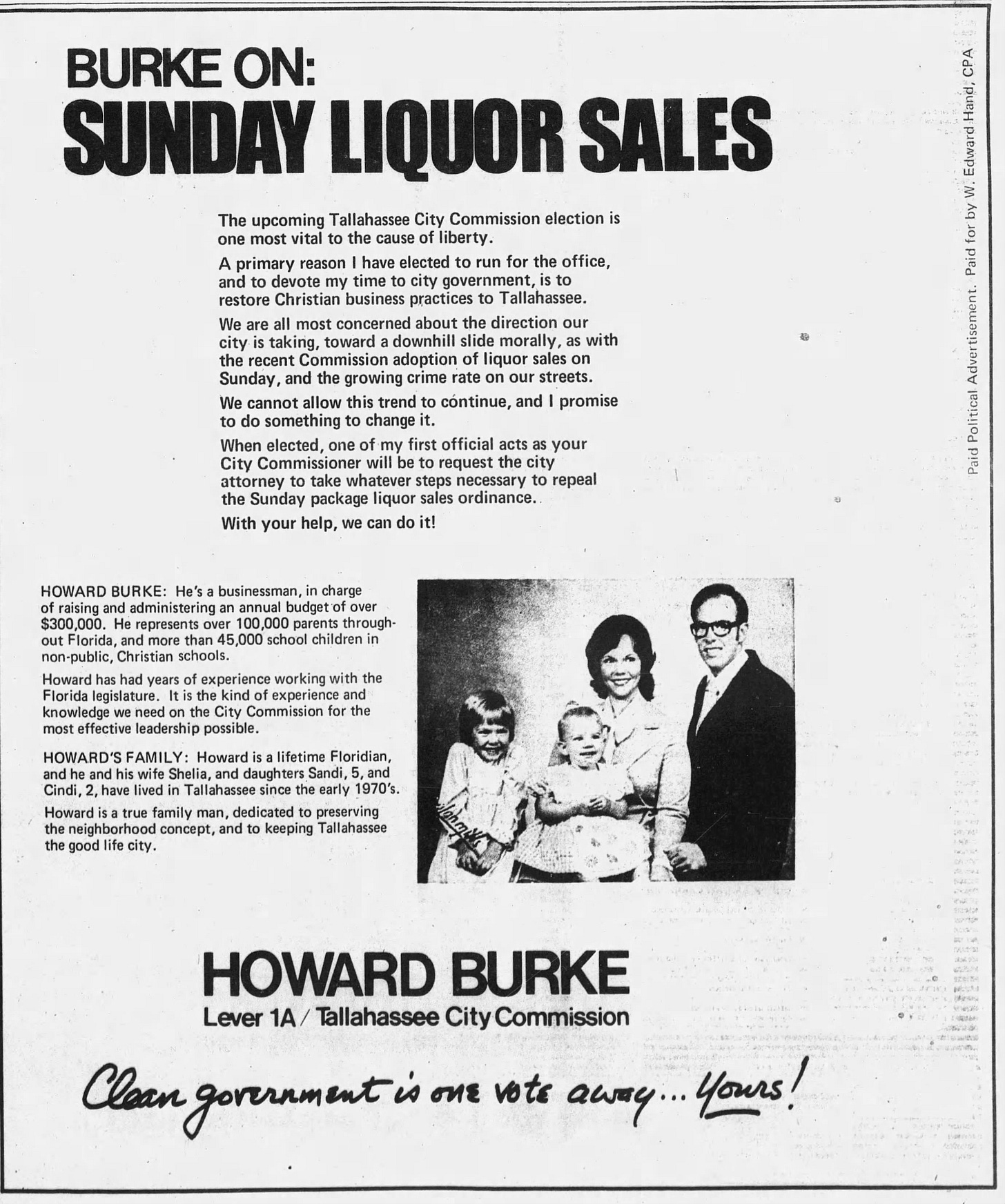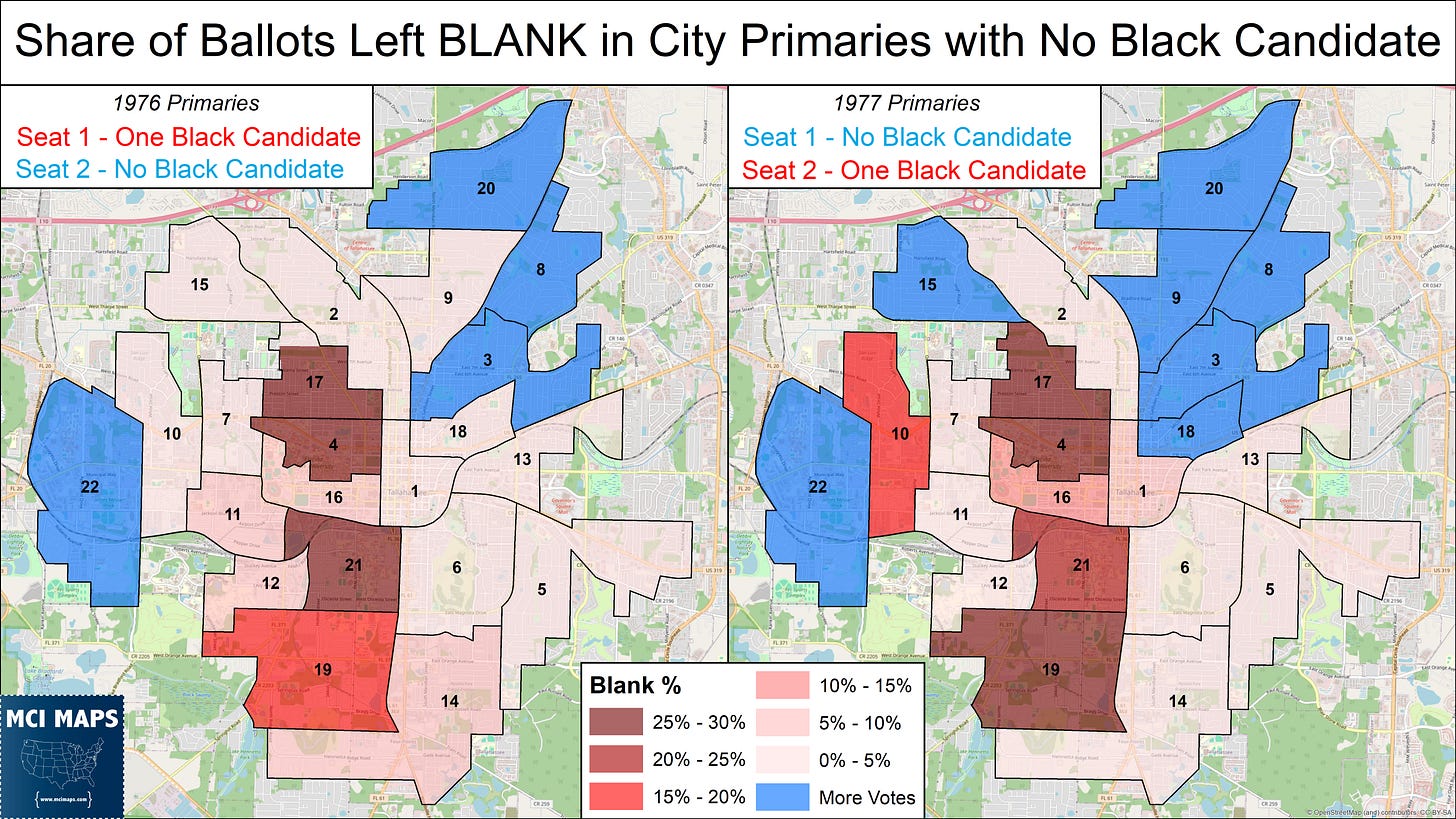Issue #199: Black Representation in Tallahassee Part 10: Growing Apathy
The 1970s end with a whimper
Since February of this year, I have been doing a series on the evolution of Black political power in Tallahassee, Florida. My series began in in the 1957 elections; when the first Black candidate since reconstruction ran for Tallahassee office. I covered the election of James Ford in 1971 as the city’s first Black commissioner. I have since covered the struggles of other Black candidates to make inroads in the majority-white city; with Ford being the lone candidate able to break the still racially-polarized voting of the city.
!You can find each article in this series here!
By the late 1970s, Tallahassee was no longer the conservative small town of 1957, growing more liberal with rising University and State Capital presence, but it still showed that most Black candidates were being held to a higher standard than white counterparts. As a result, by the late 1970s, a sense of resignation and apathy were emerging among Black voters in city elections. The 1978 contest, which I will be discussing today, will highlight this point.
Following this issue, I will be taking a break from this series until after the November general elections. I want to be able to dedicate proper research time to these articles. Therefore, my plan is to wrap up the 1970s here. Post-November, I will be resuming this series by looking at the monumental 1980s; which saw Black candidates find much more success in Tallahassee elections. The 1980s are a critical moment for racial dynamics in both Tallahassee and Leon County elections; representing the city moving fully away from its old southern roots and into the more racially progressive area it is today.
Before we get to that, however, we must round out some 1970s disappointments.
The 1978 Primary Election
In February of 1978, one seat was up for a full term. Incumbent Ben Thompson, who’s monumental 1975 win marked the end of the Good-old boy system, opted not to run for re-election after a litany of high-profile policy clashes. In his wake, a total of EIGHT people would compete for the seat. Races were becoming more crowded than ever before. The candidates were….
John Burt - Former assistant to city manager and current director of Minority Affairs for FSU
Alice Peacock - Retired teacher and community activist
Howard Burke - Executive Director of Florida Association of Christian Schools
Margaret Lynn Duggar - Director of Senior Society Planning Council
John Flynn - Leon High bookkeeper
Greg Girard - Recently graduated, former FSU Student body president
Robert Marion - Retired army colonel and former city supply manager
Hurley Rudd - Local businessman
Two of the candidates were Black. The most high-profile was John Burt, who had ties to both Florida State University and the City itself.
Burt had a strong resume; serving with the City Manager as well as being the current director of Minority Affairs at FSU. He stood the best chance of replicating James Ford’s wins; which required strong white backing - and dare I say “comfort” with a Black candidate. Burt’s city administration ties were a big asset.
Along with Burt competing for the Black vote was Alice Peacock; a retired teacher with a strong community activist background.
Burt had far more details and city experience, but Peacock had a strong base of support through social in the Black community as well. This gave Black voters two candidates; which increased the risk of a split vote and relegating neither to a runoff spot.
The race was extremely quiet, with few major controversies arising. The Leon Elections Supervisor quipped “This is the quietest of any election I think I’ve been a part of.” One notable topic was that, like recent elections, more candidates were openly talking about the city being involved in social services.
Back in my 1973 and 1974 articles, I discussed how Rosa Houston was an outsider for advocating for a more hands-on city effort regarding social services. This then-fringe position was increasingly becoming the normal take in the city. It further emphasized that the city was moving out of its “small southern town” phase and into “capital city metro.”
One anecdote that represents how much Tallahassee had moved away from its conservative southern heritage was the struggles of candidate Howard Burke; who ran as a social conservative. Burke’s conservativism was so front-and-center that he even ran ads attacking the fact the city had recently begun Sunday liquor sales.
Burke’s social conservative image would have played very well in the past. However, a spoiler here, Burke would come in 5th and get just 7% of the vote; securing no more than 15% in any precinct. While Burke’s more conservative style no doubt had supporters; no one was being moved into a conservative rebellion over liquor on Sundays; something that was once a major issue. Leon County had only been wet in the 1960s.
The race was largely a quick dash by the candidates to sell voters on their positions. Little real controversy or scandal emerged. When the first round results came in, Hurley Rudd and Margaret Duggar advanced to the runoff. Burt and Peacock split the Black vote, but even if combined would not have made the runoff.
The results were actually striking in that Burt came in 3rd but won no precincts; while Peacock took four of them. Peacock’s social ties allowed her to win the majority-Black precincts of the city. However, Burt won over more voters across the whiter suburbs; albeit consistently trailing Duggar and Rudd.
Jarring is the racial discrepancies; with the combined share for both Burt and Peacock falling under 10% in the eastern heavily white precincts. Burt, for all his ties with the City Government, could not break through in the white suburbs nearly enough to secure a runoff spot; even if he’d had all of Peacock’s support.
This was another disappointing result for Black community leaders and voters in Tallahassee elections.
Black Voter Runoff Apathy
In the wake up the primary, both Rudd and Duggar made efforts to earn Black support. In the two week runoff period, Black voters received a great deal of attention as potential kingmakers in the runoff.
Peacock said she wouldn’t endorse either candidate, saying she considered both friends. Burt, meanwhile, opted to endorse Duggar, saying she fit better with him on efforts for street and home revitalization.
Despite the potential to be kingmakers, the Black voter reaction to the runoff was apathy. Duggar narrowly won the Black community while narrowly losing the race to Rudd. The bigger story, however, was how much Black turnout decreased in the two week period.
In the three majority-black precincts, the vote total fell by over 40%, far outpacing the 8% decline citywide. Despite the focus from the runoff candidates, voters in Frenchtown and Southside did not see a candidate they really felt spoke for them.
This issue of apathy is worth discussing in some more detail.
The Trend of Black Voter Apathy
The lack of Black turnout in the 1978 runoff was not a one-off affair. Consistently by this point, the lack of a Black candidate in a race would lead to less Black voter interest in a race. It was clear that the city’s Black voters felt many of the white candidates, even as they vied for community support, did not really represent their concerns.
Here are some examples….
In the 1977 contests, James Ford, the lone Black commissioner, was re-elected in the primary with over 50%. Ford faced no strong opponent, with much of the focus being on the other commission seat. In the runoff for the other commission seat, the vote total was down the most in the heavily Black precincts. Without Ford on the ballot, Black voters felt little reason to show up.
As the runoff map on the right side also highlights, total turnout was just 16% - way down from the 40%+ turnout in the 1976 runoff. Turnout was down across the city to be sure, but it also is notable how much lower west city turnout was than the upper-income white eastern suburbs.
Even in contests where a Black candidate appeared, there was still a notable lack of interest among Black voters toward all-white races. In both 1976 and 1977’s primaries, two seats were contest at the same time. In both years, only one seat had a Black candidate, while the other seat had only white candidates. In both of those instances, the seat without a Black candidate had fewer votes cast. In the heavily Black precincts, the amount of ballots left BLANK for the white-only race was over 20%.
Meanwhile, some of the whitest precincts actually saw more votes cast for the white-only race than a race with a Black candidate…..
So in both 1976 and 1977 primaries, we see that Black voters being galvanized to the polls for a Black candidate has much less interest in choosing among white candidates for the other contest.
Strong Black candidates were critical for driving Black turnout. Unfortunately, I don’t have turnout by race data for this era. However, I can compare turnout in the city’s three majority-black precincts. Below is a table showing the Primary and Runoffs for the 1974 to 1978 city council contests. I show the registration, vote, and turnout for the city as a whole vs the three majority-black precincts. As the table shows, several years saw the Black precincts have higher turnout than the city as a whole.
All these trends point to the importance of Black candidates in driving turnout. All these races are discussed in my series.
1974 - Young Black female candidate Rosa Houston advanced into the runoff. She was not given the respect or support she deserved, being considered too liberal for the city. Despite being outgunned and ultimately losing the runoff, she still kept Black turnout on par with the city average.
1975 - Rosa Houston ran again against an incumbent but had little money and it was a short campaign. She lost the first round and no runoff was needed. In the runoff for a different commission seat, the lack of any Black candidates led to a further drop in Black precinct turnout.
1976 - Young Black Attorney Harold Knowles came in first in the primary and narrowly lost a runoff for one of the two seats up that year. His strong campaign generated excellent Black turnout, nearly giving him the win.
1976 - James Ford, the lone Black commissioner, won against C-list opponents in the first round, avoiding a runoff. With the runoff for the other commission seat being between two white candidates, Black turnout cratered.
1978 - When neither Black candidate advanced into the runoff for the lone commission seat contested, it led to a big drop in Black turnout.
The story is clear, Black voters felt most invested when a Black candidate was on the ballot. Short-lived efforts by white candidates to win over Black voters in runoffs was not yielding the “kingmaker” status that the 1978 runoff coverage predicted.
Looking Ahead to the 1980s
After the 1978 contests, no commission seat would be up in 1979. Then the 1980 races would see no Black candidate file for either commission district. With this stagnation, there was continued debate about Tallahassee moving to commission districts. As that debate continued, Leon County would be rocked by lawsuits and debates over its government system. Eventually a Voting Rights Act lawsuit would force the Leon Commission into single-member districts designed to increased Black representation. How Tallahassee avoided this same order is heavily tied to success from a new group of Black candidates.
I will pick up with the Tallahassee story on the other side of this national election.












